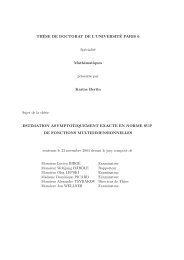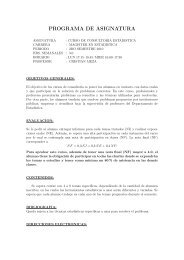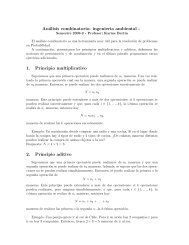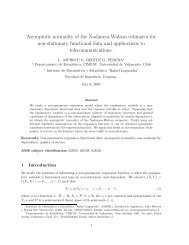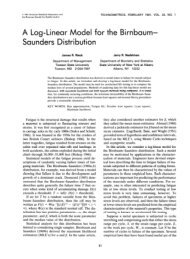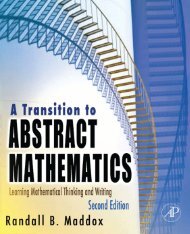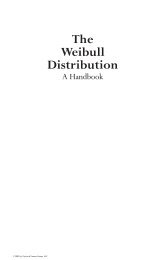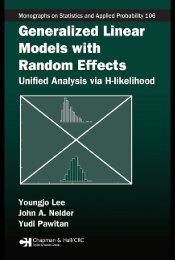recent developments in high frequency financial ... - Index of
recent developments in high frequency financial ... - Index of
recent developments in high frequency financial ... - Index of
Create successful ePaper yourself
Turn your PDF publications into a flip-book with our unique Google optimized e-Paper software.
70<br />
Table 3 Simulation <strong>of</strong> the base-l<strong>in</strong>e VEC model for the entire sample<br />
Absolute IRF×100<br />
Buy/ask vs. buy/bid Ask Bid Ask-bid t-test<br />
NYSE 1996 Mean 0.9749 0.1042 0.8707*<br />
Std. (0.3889) (0.0964) (0.3241)<br />
NYSE 2000 Mean 1.0570 0.2129 0.8441*<br />
Std. (0.8160) (0.2195) (0.6900)<br />
SSE 2000 Mean 0.3643 0.1239 0.2404*<br />
Std. (0.4103) (0.1644) (0.2518)<br />
Total Mean 0.7987 0.1470 0.6517*<br />
Std. (0.6375) (0.1695) (0.5374)<br />
Sell/ask vs. sell/bid Bid Ask Bid-ask<br />
NYSE 1996 Mean 0.8844 0.1024 0.7821*<br />
Std. (0.3028) (0.1102) (0.2147)<br />
NYSE 2000 Mean 1.0043 0.3447 0.6596*<br />
Std. (0.7174) (0.3187) (0.4584)<br />
SSE 2000 Mean 0.3021 0.1026 0.1994*<br />
Std. (0.2695) (0.1002) (0.1705)<br />
Total Mean 0.7303 0.1832 0.5470*<br />
Std. (0.5560) (0.2283) (0.3925)<br />
Buy/ask vs. sell/bid Buy/ask Sell/bid Difference<br />
NYSE 1996 Mean 0.9749 0.8844 0.0905**<br />
Std. (0.3889) (0.3028) (0.1585)<br />
NYSE 2000 Mean 1.0570 1.0043 0.0528***<br />
Std. (0.8160) (0.7174) (0.1193)<br />
SSE 2000 Mean 0.3643 0.3021 0.0622<br />
Std. (0.4103) (0.2695) (0.1719)<br />
Total Mean 0.8445 0.7935 0.0510**<br />
Std. (0.6277) (0.5513) (0.1200)<br />
This table reports statistical tests on the average impulse–response functions (IRFs) <strong>of</strong> the VEC model<br />
0<br />
1<br />
1 0 AaB AaB at<br />
B 0 1 AbB AbS C bt<br />
B<br />
C<br />
@ 0 0 1 0 A ex<br />
0 0 0 1<br />
B t<br />
ex S 0 1<br />
B C<br />
B C<br />
@ A<br />
t<br />
¼<br />
EC<br />
a L ð Þ<br />
EC<br />
b L<br />
0 1<br />
at 1<br />
B ð ÞC<br />
bt B C<br />
1<br />
st @<br />
BðLÞ A 1 þ AL ð Þ<br />
ex<br />
SðLÞ B t 1<br />
ex S 0 1<br />
B C<br />
B C<br />
@ A<br />
t 1<br />
þ<br />
ua t<br />
ub t<br />
uB t<br />
uS 0 1<br />
B C<br />
B C<br />
@ A<br />
0<br />
1t<br />
AaaðLÞ 0 AaBðLÞ AaSðLÞ B 0 AbbðLÞ AbBðLÞ AbSðLÞ C<br />
with the restrictions, AL ð Þ ¼ B<br />
C<br />
@ ABaðLÞ 0 ABBðLÞ ABSðLÞA 0 ASbðLÞ ASBðLÞ ASSðLÞ We compare (a) the impact <strong>of</strong> a unitary buyer-<strong>in</strong>itiated shock on the ask and bid quotes; (b) the<br />
impact <strong>of</strong> unitary seller-<strong>in</strong>itiated shock on the ask and bid quotes, and (c) the impact <strong>of</strong> a unitary<br />
buyer-<strong>in</strong>itiated shock on the ask quote with the impact <strong>of</strong> a unitary seller-<strong>in</strong>itiated shock on the bid<br />
quote. We use data on 11 NYSE-listed stocks from January to March 1996, 11 NYSE-listed<br />
stocks from January to March 2000, and 11 SSE stocks from July to September 2000. We report<br />
statistical tests <strong>of</strong> the null <strong>of</strong> equality <strong>of</strong> the absolute IRFs aga<strong>in</strong>st the alternative <strong>of</strong> a positive<br />
difference. The error-correction term is the bid-ask spread. Δat (Δbt) is the change <strong>in</strong> the ask (bid)<br />
ð Þ and<br />
quote between two consecutive trades. The trade-size <strong>in</strong>dicators are ex B t ¼ xBt log Vt<br />
ex S t ¼ xS t log Vt<br />
ð Þ, where Vt is the trade size <strong>in</strong> number <strong>of</strong> shares, and xt B (xt S ) equals 1 for buys<br />
(sells) and zero otherwise. For midpo<strong>in</strong>t trades both variables equal zero<br />
*Statistically greater than zero at the 1% level<br />
**Statistically greater than zero at the 5% level<br />
***Statistically greater than zero at the 10% level<br />
A. Escribano and R. Pascual



